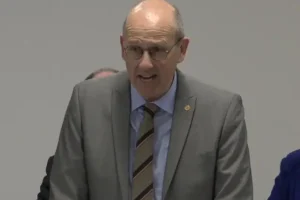WITNESSES called for a fully independent process to deal with bullying, harassment or sexual misconduct by Senedd Members amid concerns about politics trumping fairness.
Jane Runeckles, of the FDA trade union – which primarily represents civil service managers – urged Wales to follow Westminster’s lead by setting up an independent complaints process.
Currently, politicians in Wales “mark their own homework” with the standards committee – which is made up of Senedd Members – handling complaints against their peers. Similarly, the First Minister oversees complaints made against their own cabinet colleagues.
Ms Runeckles, a former special adviser to then-First Minister Mark Drakeford, argued politicians should play no part in the process nor decisions on sanctions.
Calling for a properly resourced complaints procedure, she suggested establishing a panel made up of independent experts as happened in Westminster five years ago.
The FDA warned: “If there is any opportunity for self-regulation, politics will take precedence over fairness and the victims of bullying, harassment and sexual harassment will be failed.”
The union also urged Wales to follow Westminster’s example by introducing a “risk-based exclusion policy”. Under the policy agreed by the House of Commons, politicians arrested on suspicion of a violent or sexual offence can be excluded from the parliamentary estate.
Giving evidence to the standards committee on June 2, Ms Runeckles called for a more appropriate process for dealing with bullying, harassment or sexual misconduct complaints.
She said handling complaints in the same way as, for example, misuse of expenses risks promoting a lack of confidence in the system. She also warned the current system is often overly complicated and legalistic for complainants to navigate.
Ms Runeckles told the committee: “Providing a full independent place as the first port of call is something that would encourage greater confidence in the system.”
She added: “The issues around gender balance in terms of people assessing those or doing any of the investigating or interviewing with complaints is, I think, extraordinarily important.”
Currently, Douglas Bain, the Senedd’s standards commissioner, investigates complaints and the standards committee considers his findings, deciding what – if any – action to take.

The committee, which includes Labour, Plaid Cymru and Conservative politicians, makes recommendations concerning complaints that the Senedd then votes on.
Pressed about the appropriate place for Senedd oversight, Ms Runeckles told the committee: “I think that’s a key question for you to consider.
“I think we’d argue the independent panel should make the recommendation to the Senedd but I can see you would be removing an enormous part of the work you currently undertake.
“For people to have confidence in the system, is the recommendation of the independent person going through another body – which is essentially back to the peers of the individual making that judgement – the right call?”
Ms Runeckles said: “The key in relation to bullying, harassment and sexual misconduct is that people understand there is a process dedicated to that, that has expertise and… independence behind it – and that is the fundamental bit that is missing at the moment.”
The FDA criticised a six-month limit for complaints, which cannot be made against former Senedd Members, warning this could incentivise politicians to “run down the clock”.
In Westminster, there is no such time limit for complaints of sexual misconduct and a one-year cut-off point for complaints centred on bullying.
Hannah Stevens, chief executive of Elect Her, which helps women enter politics, echoed calls for an independent process, as did the Unite union and Race Council Cymru.
Ms Runeckles said she has written to the Welsh Government, expressing concerns about the ministerial code and the First Minister being the “ultimate arbiter of a minister’s fate”.
The code governs the conduct of Senedd Members who are part of the Welsh Government and some have warned the First Minister acts as “judge, jury and executioner”.
Similarly, the Equality and Human Rights Commission (EHRC) raised concerns about Elin Jones, the Senedd’s speaker or Llywydd, having discretion not to refer certain complaints.
In its evidence, the EHRC pointed to a 2023 complaint – centred on “discriminatory” remarks by a politician about the Gypsy, Roma and Traveller community – which was shut down.















